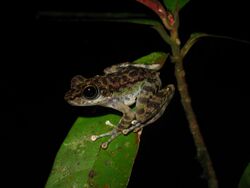Biology:Amolops
| Cascade frogs | |
|---|---|

| |
| Amolops panhai | |
| Scientific classification | |
| Kingdom: | Animalia |
| Phylum: | Chordata |
| Class: | Amphibia |
| Order: | Anura |
| Family: | Ranidae |
| Genus: | Amolops Cope, 1865 |
| Species | |
|
Many, see text | |
Amolops (commonly known as cascade frogs or sucker frogs) is a genus of true frogs (family Ranidae) native mainly to eastern and south-eastern Asia. These frogs are closely related to such genera as Huia, Meristogenys, Odorrana, Pelophylax and Rana, but still form a distinct lineage among the core radiation of true frogs.[1] They are commonly known as "torrent frogs" after their favorite habitat - small rapid-flowing mountain and hill streams - but this name is used for many similar-looking frogs regardless of whether they are loosely related.
Several species are highly convergent with other Ranidae "torrent frogs". A. archotaphus and its relatives for example very much resemble Odorrana livida. In another incidence of convergent evolution yielding adaptation to habitat, the tadpoles of Amolops, Huia, Meristogenys as well as Rana sauteri have a raised and usually well-developed sucker on their belly. This is useful in keeping in place in rocky torrents, where these frogs grow up. But as Odorrana and Staurois from comparable habitat prove, this sucker is by no means a necessity and other means of adaptation to torrent habitat exist.[2]
Species
The delimitation of this genus has proven complicated, with many species believed to belong elsewhere. Due to the degree of convergent evolution, DNA sequence studies are very helpful in assigning species to the genera, though the possibility of past hybridization cannot be discounted in Ranidae.[1]
New species are described on a regular basis. At least one undescribed species is known to exist, a very distinct form from Phetchaburi in Thailand that is possibly closer to A. marmoratus than to most others.[3]
- Amolops afghanus (Günther, 1858)
- Amolops akhaorum Stuart, Bain, Phimmachak, and Spence, 2010
- Amolops albispinus Sung, Hu, Wang, Liu, and Wang, 2016
- Amolops aniqiaoensis Dong, Rao, and Lü, 2005
- Amolops archotaphus (Inger and Chan-ard, 1997)
- Amolops assamensis Sengupta et al., 2008
- Amolops australis Chan, Abraham, Grismer, and Grismer, 2018
- Amolops bellulus Liu, Yang, Ferraris, and Matsui, 2000
- Amolops caelumnoctis Rao and Wilkinson, 2007
- Amolops chakrataensis Ray, 1992
- Amolops chayuensis Sun, Luo, Sun, and Zhang, 2013
- Amolops chunganensis (Pope, 1929)
- Amolops compotrix (Bain, Stuart, and Orlov, 2006)
- Amolops cremnobatus Inger and Kottelat, 1998
- Amolops cucae (Bain, Stuart, and Orlov, 2006)
- Amolops daiyunensis (Liu & Hu, 1975)
- Amolops daorum (Bain, Lathrop, Murphy, Orlov, and Ho, 2003)
- Amolops formosus (Günther, 1876)
- Amolops gerbillus (Annandale, 1912)
- Amolops gerutu Chan, Abraham, Grismer, and Grismer, 2018
- Amolops granulosus (Liu and Hu, 1961)
- Amolops hainanensis (Boulenger, 1900)
- Amolops himalayanus (Boulenger, 1888)
- Amolops hongkongensis (Pope and Romer, 1951) – Hong Kong Cascade Frog
- Amolops indoburmanensis Dever, Fuiten, Konu, and Wilkinson, 2012
- Amolops iriodes (Bain and Nguyen, 2004)
- Amolops jaunsari Ray, 1992
- Amolops jinjiangensis Su, Yang, and Li, 1986
- Amolops kaulbacki (Smith, 1940)
- Amolops kohimaensis Biju, Mahony, and Kamei, 2010
- Amolops larutensis (Boulenger, 1899)
- Amolops lifanensis (Liu, 1945)
- Amolops loloensis (Liu, 1950)
- Amolops longimanus (Andersson, 1939)
- Amolops mantzorum (David, 1872)
- Amolops marmoratus (Blyth, 1855)
- Amolops medogensis Li and Rao, 2005
- Amolops mengdingensis Yu, Wu, and Yang, 2019
- Amolops mengyangensis Wu and Tian, 1995
- Amolops minutus Orlov and Ho, 2007
- Amolops monticola (Anderson, 1871)
- Amolops nidorbellus Biju, Mahony, and Kamei, 2010
- Amolops nyingchiensis Jiang, Wang, Xie, Jiang, and Che, 2016
- Amolops ottorum Pham, Sung, Pham, Le, Ziegler, and Nguyen, 2019
- Amolops pallasitatus Qi, Zhou, Lyu, Lu, and Li, 2019
- Amolops panhai Matsui & Nabhitabhata, 2006
- Amolops ricketti (Boulenger, 1899)
- Amolops shuichengicus Lyu and Wang, 2019
- Amolops sinensis Lyu, Wang, and Wang, 2019
- Amolops spinapectoralis Inger, Orlov, and Darevsky, 1999
- Amolops splendissimus Orlov and Ho, 2007
- Amolops torrentis (Smith, 1923)
- Amolops tuberodepressus Liu and Yang, 2000
- Amolops viridimaculatus (Jiang, 1983)
- Amolops vitreus (Bain, Stuart, and Orlov, 2006)
- Amolops wenshanensis Yuan, Jin, Li, Stuart, and Wu, 2018
- Amolops wuyiensis (Liu and Hu, 1975)
- Amolops xinduqiao Fei, Ye, Wang, and Jiang, 2017
- Amolops yatseni Lyu, Wang, and Wang, 2019
- Amolops yunkaiensis Lyu, Wang, Liu, Zeng, and Wang, 2018
Footnotes
References
- Cai, Hong-xia; Che, Jing, Pang, Jun-feng; Zhao, Er-mi & Zhang, Ya-ping (2007): Paraphyly of Chinese Amolops (Anura, Ranidae) and phylogenetic position of the rare Chinese frog, Amolops tormotus. Zootaxa 1531: 49–55. PDF abstract and first page text
- Stuart, Bryan L. (2008): The phylogenetic problem of Huia (Amphibia: Ranidae). Mol. Phylogenet. Evol. 46(1): 49–60. doi:10.1016/j.ympev.2007.09.016 (HTMl abstract)
Wikidata ☰ Q1735006 entry
 |
